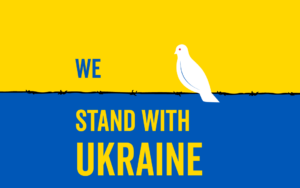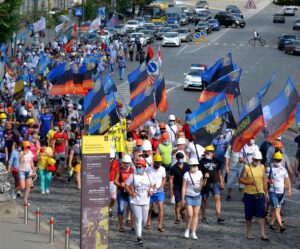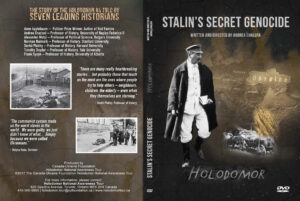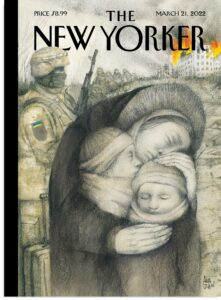Ukraine’s remarkable resilience will be highlighted when President Volodymyr Zelenskyy addresses members of the U.S. Congress on Wednesday amid Russia’s ongoing war against his country, House Speaker Nancy Pelosi and Senate Majority Leader Chuck Schumer announced in a joint statement Monday.
As Russia’s attacks continue, the National Endowment for Democracy (NED) family was hit hard by the death of Yulia Zdanovska, a 21 year-old volunteer for NED grantee Kharkiv Station and a winner of the European Math Olympics in 2017. Yulia was killed in the shelling of Kharkiv as she was helping deliver humanitarian supplies. We mourn Yulia’s loss. We stand with Ukraine, said Damon Wilson, NED’s President and CEO.
As Russia’s attacks continue, the @NEDemocracy family has lost its first member. Yulia Zdanovska, a 21-year-old volunteer for @KharkivStation, was killed in the shelling of #Kharkiv as she was helping deliver humanitarian supplies. We mourn Yulia’s loss. We stand with Ukraine. pic.twitter.com/VxxE2WrNJH
— Damon M. Wilson (@DamonMacWilson) March 14, 2022
Digital samizdat
Ukraine’s civil society activists have been using chat apps like Telegram as “the latest expression of the smaller, more controlled spaces that have always been central to incubating new ideas or challenging existing ones,” notes Gal Beckerman, the author of The Quiet Before: On the Unexpected Origins of Radical Ideas. During an earlier iteration of Russian authoritarianism, in the Soviet Union, samizdat played this role. The underground, illegal, and self-produced writing, passed hand to hand, kept alive a shadow civil society during repressive periods. Unlike the dominant social-media platforms, with their ping-pong of loud, public declarations all looking to grab maximum attention, a chat app operates on the kind of lower register that has always been crucial for a healthy civil society, he writes for The Atlantic.
 Ukraine’s independent labor unions are one of the most vibrant and energetic elements of civil society and over the past two years, the Solidarity Center* has supported and cooperated with a number of new autonomous trade unions (unaffiliated to either national union federation), and NGOs that defend human and labor rights, engage in workplace anti-corruption struggles, or advocate environmental protection for workers, the Center reports.
Ukraine’s independent labor unions are one of the most vibrant and energetic elements of civil society and over the past two years, the Solidarity Center* has supported and cooperated with a number of new autonomous trade unions (unaffiliated to either national union federation), and NGOs that defend human and labor rights, engage in workplace anti-corruption struggles, or advocate environmental protection for workers, the Center reports.
Ten of these organizations created their own federation and at least four of these unions have been especially active countering the Russian military invasion:
- Since February 24, doctors and medical staff from the Healthcare Workers Union (HWU) made hundreds of interventions to help the wounded and refugees. In recent days, the medical personnel could not go home and remained days and nights with patients in the hospitals.
-

Credit: Industriall
Prior to the war, the Agricultural Workers Union (AWU) called “Native Land” organized workers from this difficult sector, and negotiated a collective agreement with the Ministry of Agriculture. The AWU took part in the anti-corruption struggle and efforts to improve the environment in Ukraine. Today, some activists of the Union joined civil defense units, while others are helping refugees, despite the life threatening risks and scarce resources.
- The Police Employees’ Union, with members in the partly-occupied Chernihiv Oblast, is making enormous efforts to address the humanitarian catastrophe. Currently there are shortages or cutoffs of electricity, heat, water, and food. Also, the union is organizing evacuations of the civilian population which has become extremely risky because the Russian forces are bombarding the region, and are shooting at buses and cars used for the evacuations.
- The Computer and IT Workers Union organized some 8000 members. Today, they are assisting the resistance to the invasion by countering disinformation. Using modern technology approaches, union members are counter-attacking Russia’s propaganda. In addition, members of this union are designing and executing systems to improve distribution of food and medication to citizens in Kyiv and other large cities.
 The Solidarity Center today organized a protest at the Russian Ambassador’s Residence, 1125 16th Street, NW, Washington, DC, as part of an International Day of Solidarity with Ukraine, organized by the global labor movement. Learn more: Ukraine Union Members Donate $500,000 to Support War-Impacted Workers. Donate to International Trade Union Confederation (ITUC) Ukraine Fund; Nova Poshta; People in Need Ukraine; Ukrainian Red Cross Society; Caritas Ukraine; Razom for Ukraine.
The Solidarity Center today organized a protest at the Russian Ambassador’s Residence, 1125 16th Street, NW, Washington, DC, as part of an International Day of Solidarity with Ukraine, organized by the global labor movement. Learn more: Ukraine Union Members Donate $500,000 to Support War-Impacted Workers. Donate to International Trade Union Confederation (ITUC) Ukraine Fund; Nova Poshta; People in Need Ukraine; Ukrainian Red Cross Society; Caritas Ukraine; Razom for Ukraine.
Ukraine as a nation has faced suffering like few others in the last century, and its capacity to endure hardship foreshadows success against the Russian invasion. This was driven home for me when I served as an international election observer in Ukraine’s 2014 presidential election following the civil unrest known as Euromaidan, adds Peter Roskam, a former Republican U.S. representative from the Chicago area, citing the experience of visiting Bykivnia, the site of mass graves for thousands murdered by the communist secret police from the 1930s to the 1940s:
 Soviet leader Josef Stalin’s political prisoners were accused, arrested, tortured, shot and then brought to Bykivnia Forest, where they were buried in secret. The Soviets denied responsibility well into the 1980s but were forced to acknowledge this crime in the face of overwhelming evidence. Some estimates place the number of victims at 200,000. On a far grander scale was the Holodomor. This was Stalin’s man-made terror famine, in which 7 million to 10 million Ukrainians starved to death while much of the world looked the other way.
Soviet leader Josef Stalin’s political prisoners were accused, arrested, tortured, shot and then brought to Bykivnia Forest, where they were buried in secret. The Soviets denied responsibility well into the 1980s but were forced to acknowledge this crime in the face of overwhelming evidence. Some estimates place the number of victims at 200,000. On a far grander scale was the Holodomor. This was Stalin’s man-made terror famine, in which 7 million to 10 million Ukrainians starved to death while much of the world looked the other way.
Ukrainians have seen the face of international violence like this and remember, which helps explain why they now lead the world in defending the ideal of democracy and standing against tyranny, he writes for The Chicago Tribune.
 Much like in Afghanistan, the Russian army is becoming bogged down and broken. The troops are demoralized and incompetent, says Ukraine expert and Journal of Democracy contributor Dr Taras Kuzio of the Henry Jackson Society.
Much like in Afghanistan, the Russian army is becoming bogged down and broken. The troops are demoralized and incompetent, says Ukraine expert and Journal of Democracy contributor Dr Taras Kuzio of the Henry Jackson Society.
Putin now only has two cards to play: either he goes all in by escalating his lost cause and guarantees his own eventual downfall, or he rolls the dice and ends the fighting, says Doug Klain, an Assistant Director at the Atlantic Council’s Eurasia Center. His legacy is now hopelessly tarnished by the horrors of the past three weeks, but he could still cling to power and potentially pave the way for a more dignified exit in the coming years if he calls off his criminal invasion.
The Biden administration has created a precedent, revealing intelligence leading up to the Russian invasion of Ukraine. Why not build on that precedent, and reveal what intelligence we have about Putin’s money, Maduro’s money, Xi Jinping’s money, or Alexander Lukashenko’s money? asks historian Anne Applebaum.
It is no accident that Americans are united in their support for Ukraine, she adds. A large, bipartisan majority, for example, back the U.S. decision to boycott Russian oil, even if it led to higher prices. This is because Americans identify with people who are clearly fighting for their freedom, their independence, and their democracy. It is a central part of how we define ourselves, and who we are, she told the Senate Foreign Relations Committee today… RTWT
War in Ukraine: 7 Essential Reads
The Journal of Democracy has been covering the roots of Putin’s obsession with Ukraine for nearly 20 years. Here it provides 7 essential reads on the origins of the conflict, and what brought us to this dangerous moment.
Volodymyr Zelensky’s brave leadership of Ukraine in the face of Russian aggression has captivated the world. How did this former comic actor and TV personality go from a political outsider to democratic champion? Read about his rise here: https://t.co/Tl2WWQe7Jb. pic.twitter.com/T0YU10GoMT
— Journal of Democracy (@JoDemocracy) March 15, 2022
Christopher Chivvis, senior fellow and director of the American Statecraft Program at the Carnegie Endowment and a former U.S. national intelligence officer for Europe, joins “CBS News Mornings” (above) to describe possible outcome scenarios for the war.
Chat apps like Telegram are the latest expression of the smaller, more controlled spaces that kept alive a shadow civil society & incubated new ideas or challenged existing ones, like samizdat in the Soviet Union, writes @galbeckerman @TheAtlantic https://t.co/gtTAb754VW
— Democracy Digest (@demdigest) March 15, 2022







